17 Systems Administrator Resume Examples
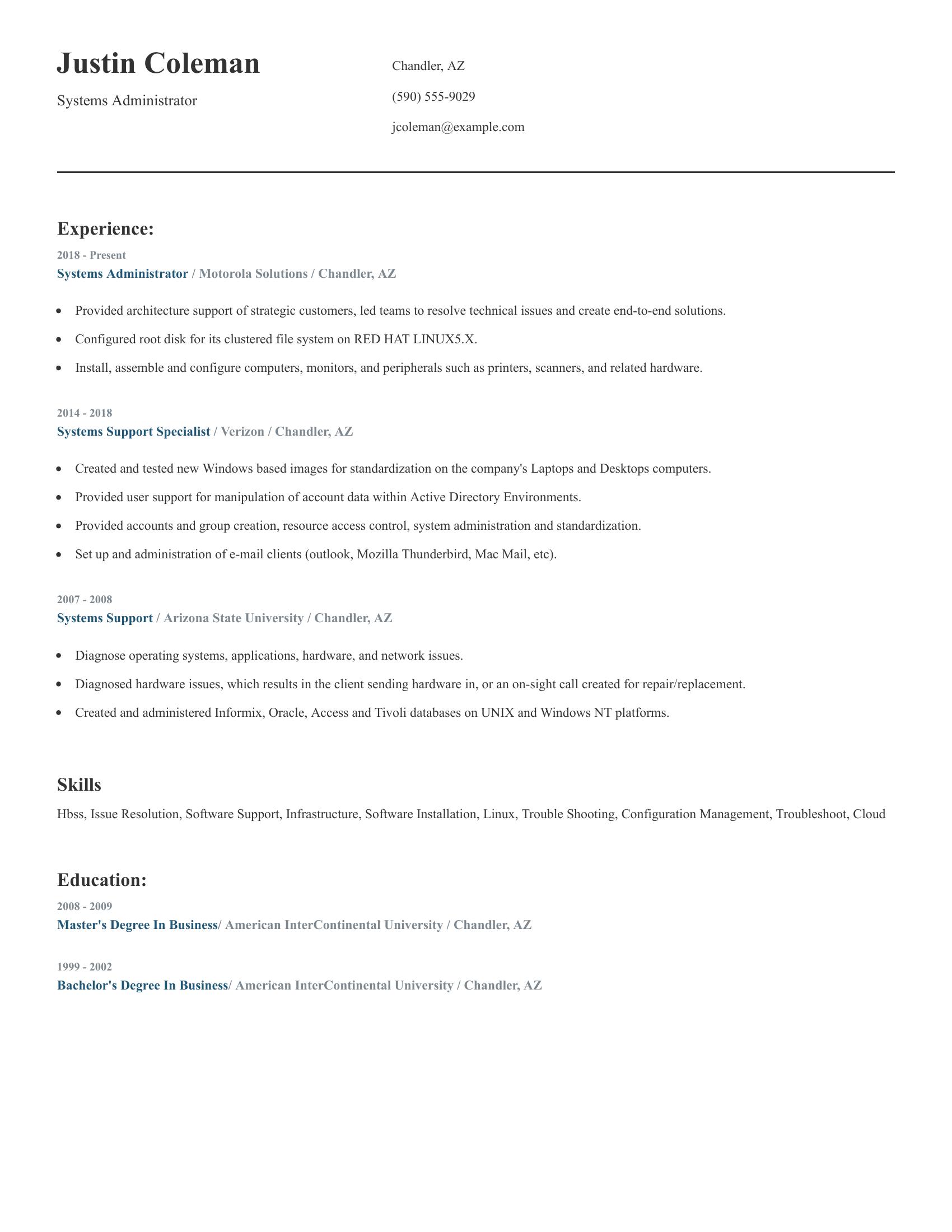



Systems administrators need to showcase experience in system configuration, network management, software installation, and troubleshooting. Their resume should display technical expertise, familiarity with various operating systems, and the ability to handle user support. Highlighting past roles with specific responsibilities and achievements is important. Mentioning relevant education and certifications also adds value.
This resume includes detailed job experience in roles such as systems administrator and systems support specialist. It lists technical tasks like configuring disk systems, creating standardized images, managing accounts in Active Directory, and setting up email clients. The resume also notes education, including a master's degree in business. These elements provide a clear picture of the candidate's qualifications and experience.

Systems engineer/systems administrator resumes should highlight technical skills, relevant work experience, and education. It should emphasize proficiency in system administration, networking, and security. Key details include specific technologies or software used, responsibilities handled, and accomplishments achieved. The resume should also list certifications or degrees related to the field.
This resume effectively includes these specifics. It lists technical skills like ERP, AWS, and network security. The employment history shows hands-on experience with UNIX, Red Hat Linux, Windows, and various software tools. It provides clear descriptions of tasks such as configuring virtual machines and migrating databases. The education section mentions a relevant degree in electrical engineering.
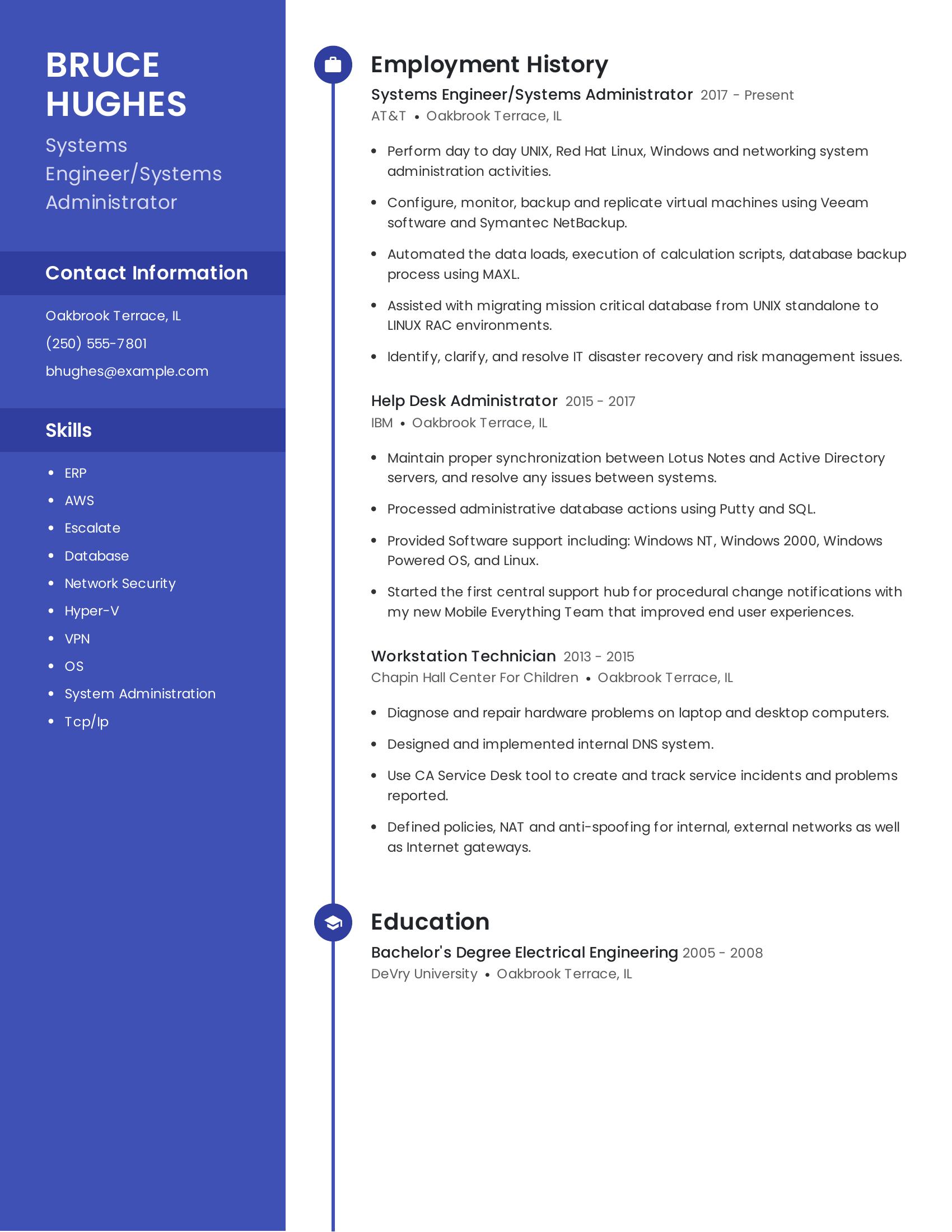
Systems administrator lead resumes should highlight technical skills, relevant work experience, and education. Important sections include contact information, a summary of skills, detailed employment history, and educational background. The resume should show expertise in systems administration, project management, and IT infrastructure while demonstrating the ability to adapt to technology changes.
This resume includes the essential elements of a strong systems administrator lead profile. It lists clear contact details and a comprehensive skill set, including project management and various IT competencies. The employment history shows progression in roles, detailing specific responsibilities and achievements in systems engineering and support. The educational background supports the candidate's qualifications with a degree in computer networking.
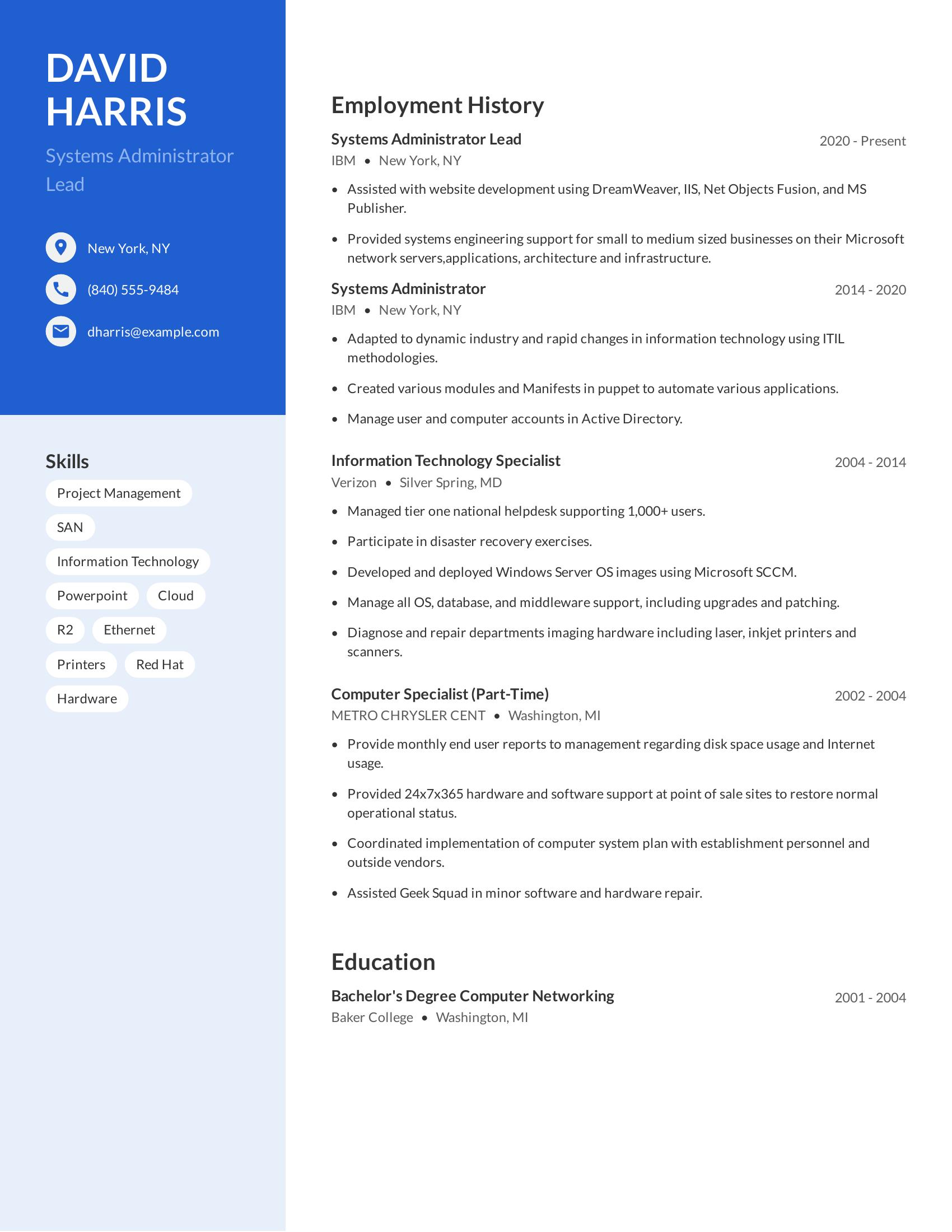
Enterprise systems administrator resumes should focus on technical skills, relevant work experience, and education. The resume should list specific technical proficiencies, such as software applications, domain controllers, and operating systems. Employment history should detail previous roles and responsibilities, highlighting achievements in system integration, upgrades, and support. Education should be included to show the foundational knowledge necessary for the role.
This resume effectively includes those specifics. It lists a range of technical skills like software applications, DNS, VPN, and Linux. Employment history is detailed with roles at prominent companies and descriptions of duties like performing audits of Active Directory objects and coordinating system upgrades. The education section clearly states a relevant degree in Computer Information Systems.
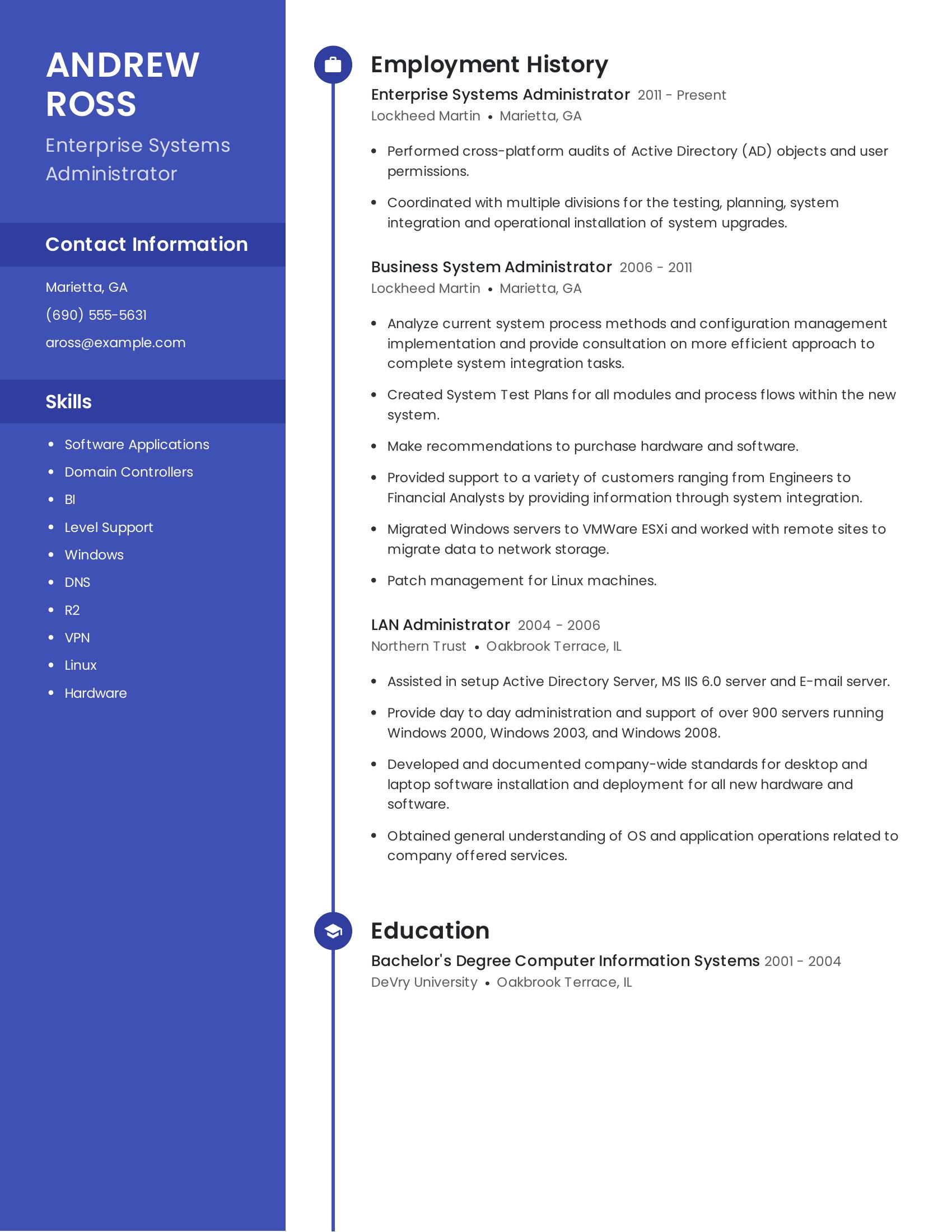
Network/server administrator resumes should highlight specific technical skills, relevant work experience, and educational background. These resumes must clearly outline experiences with network infrastructure, server management, and security protocols. Demonstrating the ability to handle various operating systems and showcasing hands-on experience with disaster recovery, backup procedures, and IT support is important. Additionally, listing skills related to Active Directory, virtualization, and database management adds value.
This resume effectively includes the required specifics. It details roles in network and server administration, highlighting security incident handling, disaster recovery, and NIS infrastructure support. It also includes previous IT support roles that show a progression in responsibilities, from software support technician to information technology/support technician. The listed skills such as Active Directory and network security align well with the job requirements. Educational background in computer science further strengthens the candidate's qualifications.
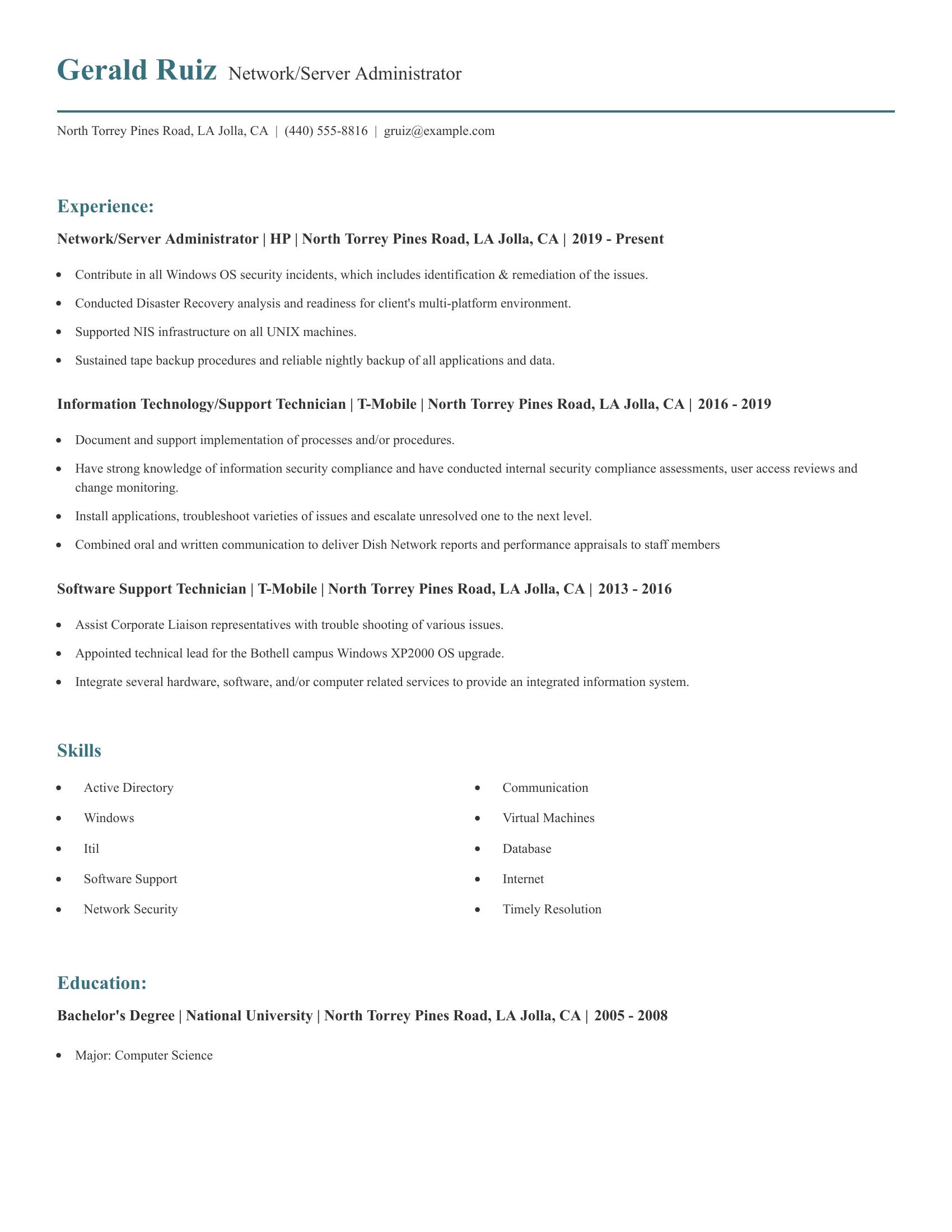
A security systems administrator resume should detail technical expertise, relevant experience, and educational background. It should highlight the candidate's proficiency in managing and maintaining security systems, familiarity with different operating systems, and ability to respond to security events. Mentioning specific job titles and responsibilities at previous positions shows a clear career progression. Listing skills related to security management, software applications, and infrastructure is also important to reflect the candidate's capabilities.
This resume includes detailed job titles and responsibilities that show experience with both security systems administration and general systems administration. It specifies tasks such as maintaining disk allocations, transferring server statuses, and responding to system events. It also lists relevant skills like information security, cloud infrastructure, and Unix software applications. The education section is concise but provides necessary information about the candidate's academic background.
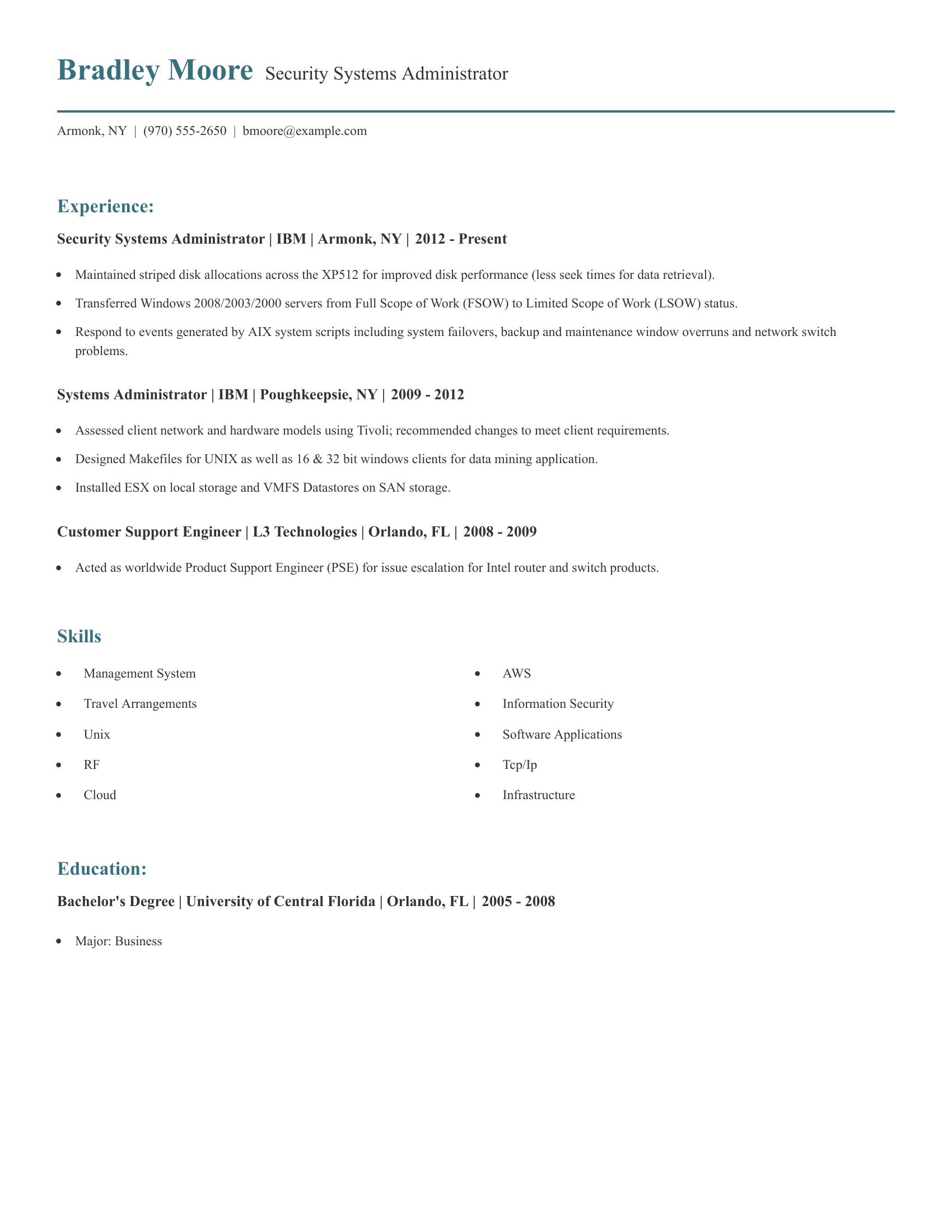
A good technical systems engineer resume should include a clear job title, contact information, relevant work experience, technical skills, and education. The work experience section should highlight specific tasks and responsibilities that demonstrate expertise in system design, installation, configuration, and administration. It should also mention experience with different operating systems and software. Technical skills should be listed clearly to show proficiency with various technologies. Education should include relevant degrees and institutions attended.
This resume includes specific job titles, contact information, detailed work experience, and relevant skills. The candidate's roles at different companies are listed with specific tasks such as performing fiber infrastructure design analysis, conducting technical interviews, and configuring servers. The resume also lists technical skills like AIX, Linux Red Hat, and Windows NT. Education is clearly stated with a degree in electrical engineering. Although the formatting needs improvement, the content effectively showcases the candidate's qualifications.
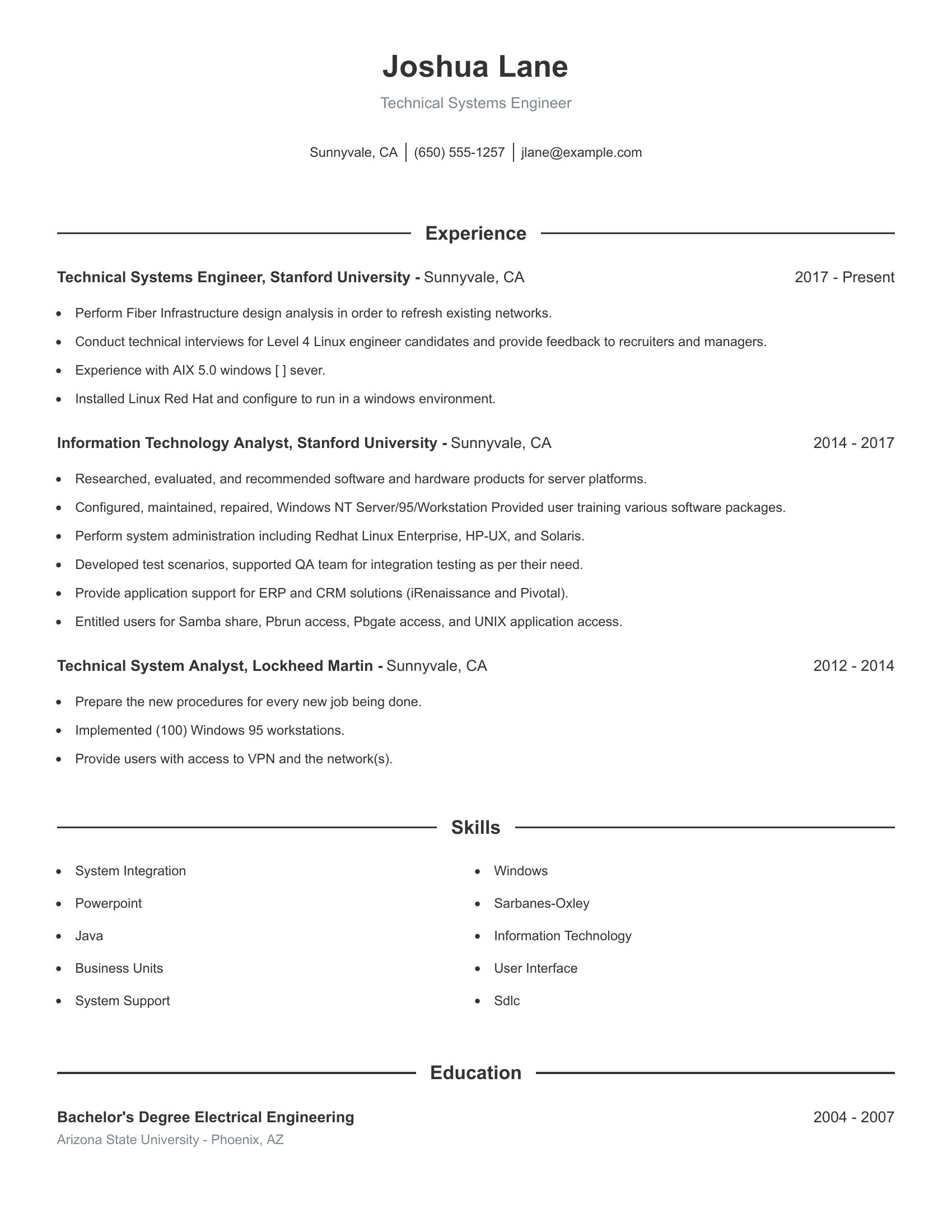
Application systems administrator resumes should highlight experience with system deployment, administration, and maintenance. They should detail specific technical skills like managing firmware upgrades and working with various operating systems. Experience in disaster recovery, hardware replacement, and coordinating maintenance is also important. An educational background in information technology adds value.
This resume includes strong examples of what makes a good application systems administrator resume. It lists relevant job experiences like managing BIOS and NIC firmware upgrades, maintaining Unix systems, and coordinating hardware maintenance. The candidate shows proficiency with disaster recovery tools and a solid educational foundation in IT. The resume also demonstrates experience with both Windows and Unix environments.
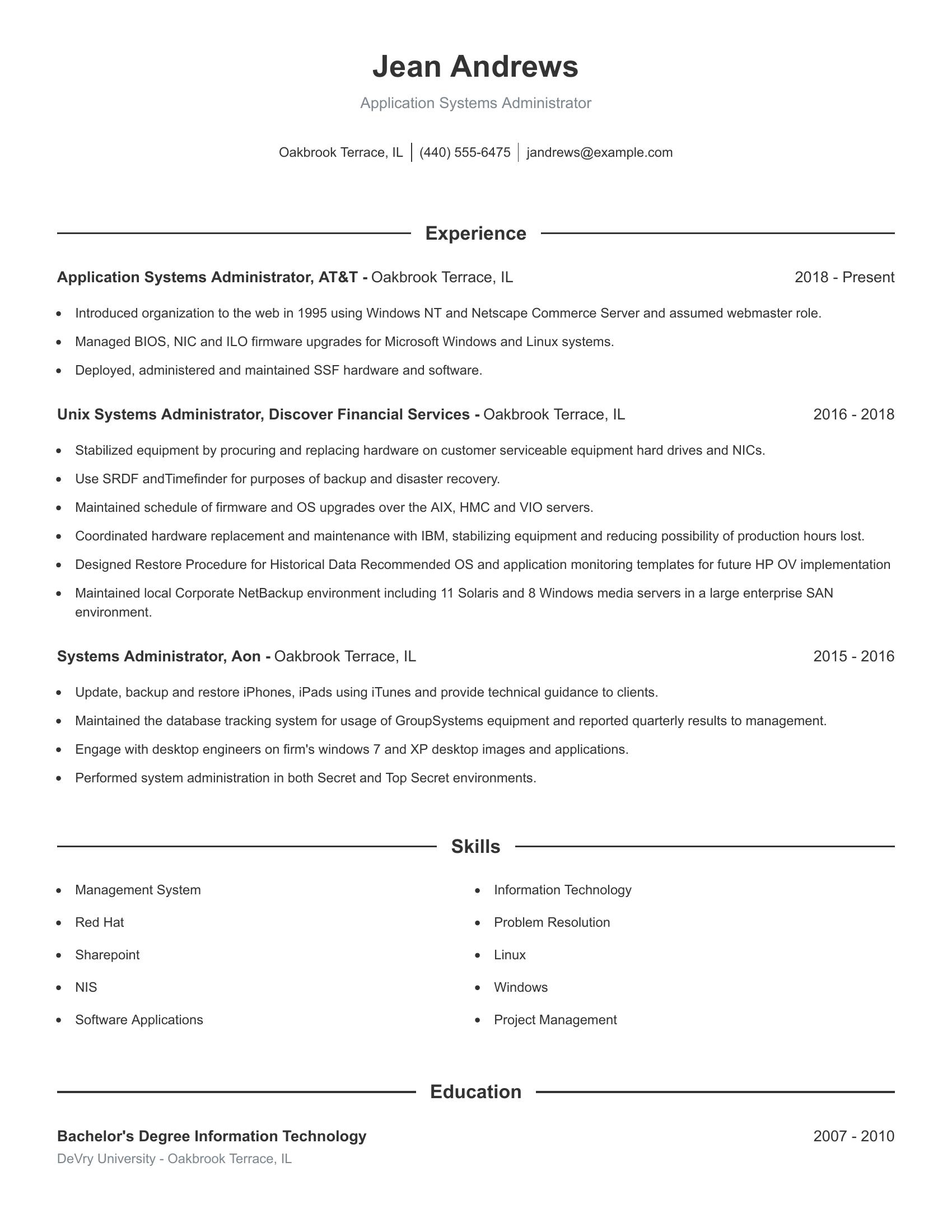
A systems support engineer resume should highlight technical skills, relevant work experience, and education. It should list specific technical proficiencies such as troubleshooting, system support, and knowledge of specific operating systems and software. Work experience should detail roles and responsibilities in supporting and maintaining IT infrastructure, showcasing problem-solving abilities and familiarity with various tools and methodologies. Educational background in a related field is also important.
This resume effectively includes these specifics by listing technical skills like CRM, Rhel, and cloud systems. The employment history section details the candidate's experience with hardware maintenance, network administration, and project management. The educational background is clearly listed with a degree in computer science, demonstrating relevant academic qualifications. The resume provides a comprehensive view of the candidate's capabilities and experiences in system support engineering.
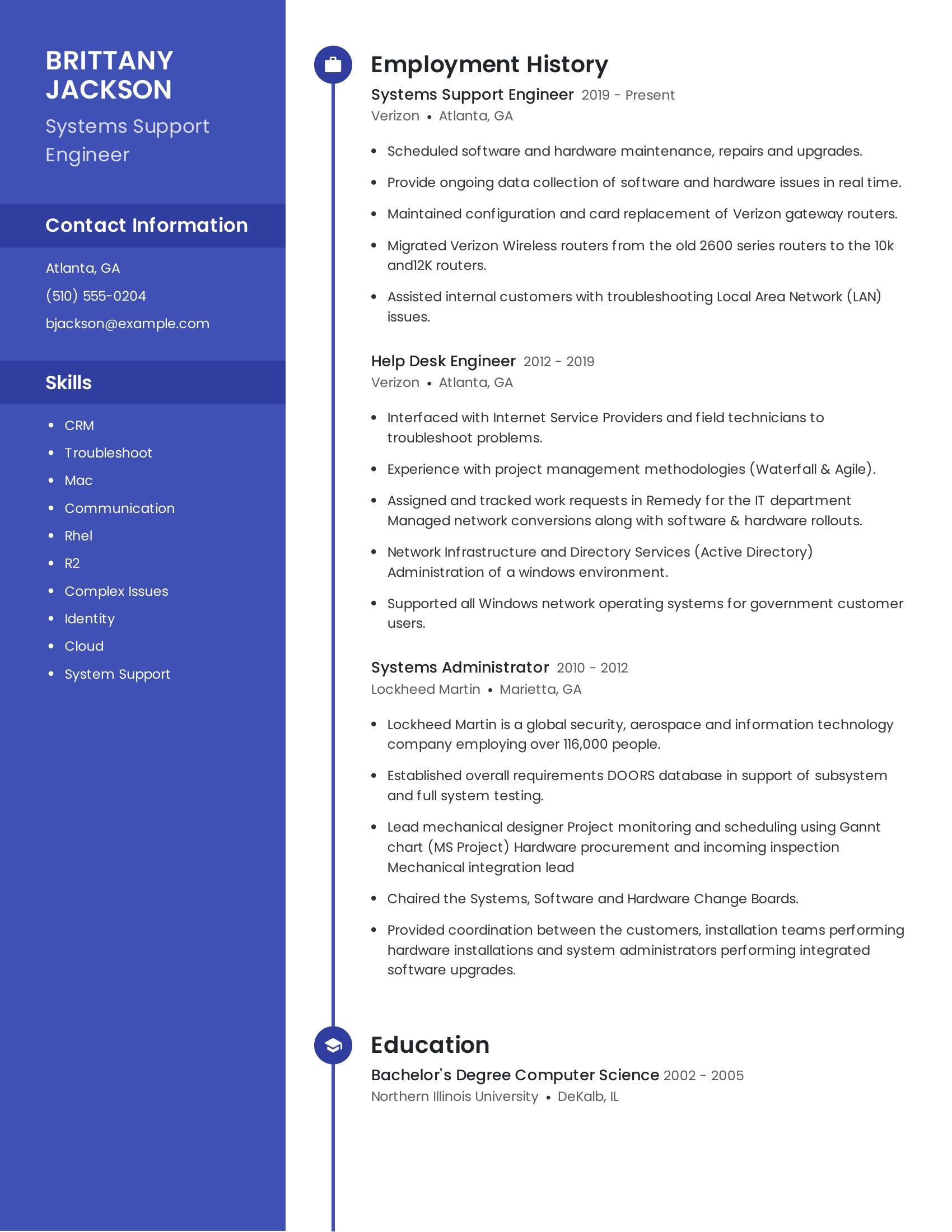
Consultant systems engineer resumes should highlight experience in system configuration, administration, and integration. They should include past roles that show a history of working with various operating systems, network protocols, and hardware setups. Demonstrating skills in troubleshooting, system performance monitoring, and database management is also important. Practical examples of resolving issues and enhancing system security can make the resume stand out.
This resume includes detailed job experiences that align with the responsibilities of a consultant systems engineer. It shows a progression through various roles involving system configuration, administration, and troubleshooting. The candidate has worked with different operating systems and network setups, which is critical for this role. Additionally, it mentions specific tasks like configuring software for helpdesks and maintaining security protocols, showcasing relevant skills.
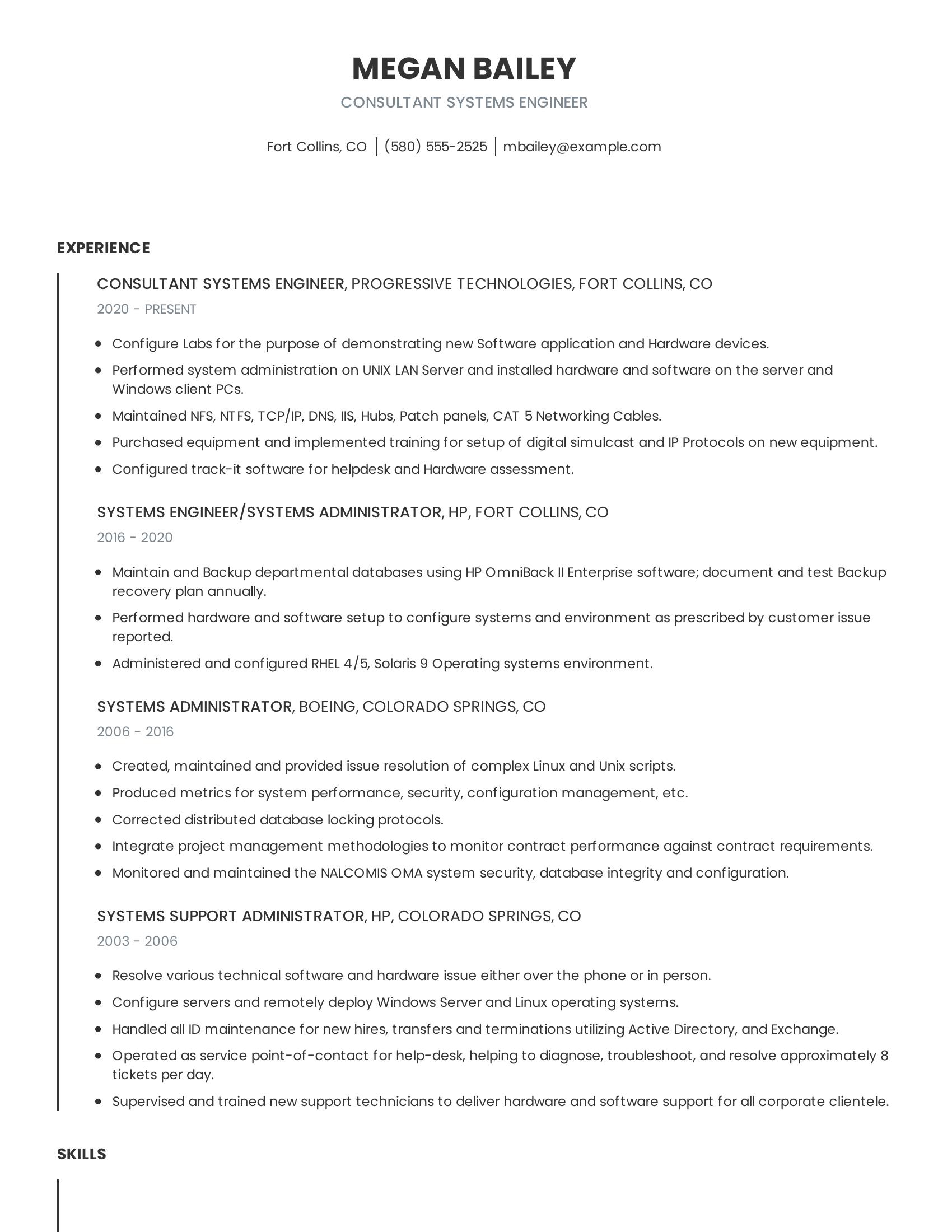
A systems support administrator resume should clearly list relevant job experiences, technical skills, and educational background. It should highlight specific responsibilities and accomplishments in previous roles. Key areas to showcase include experience with different operating systems, network troubleshooting, and familiarity with hardware and software maintenance. The resume should be straightforward and avoid unnecessary words or overly complex sentences.
This resume effectively includes the necessary elements. It lists job experiences in reverse chronological order, detailing roles in reputable companies like Microsoft and AT&T. It mentions specific tasks such as providing telephone support, maintaining EMC SAN storage, and performing network troubleshooting. The skills section succinctly covers important technical competencies like network security and configuration management. The education section clearly states the degree obtained and the institution attended.
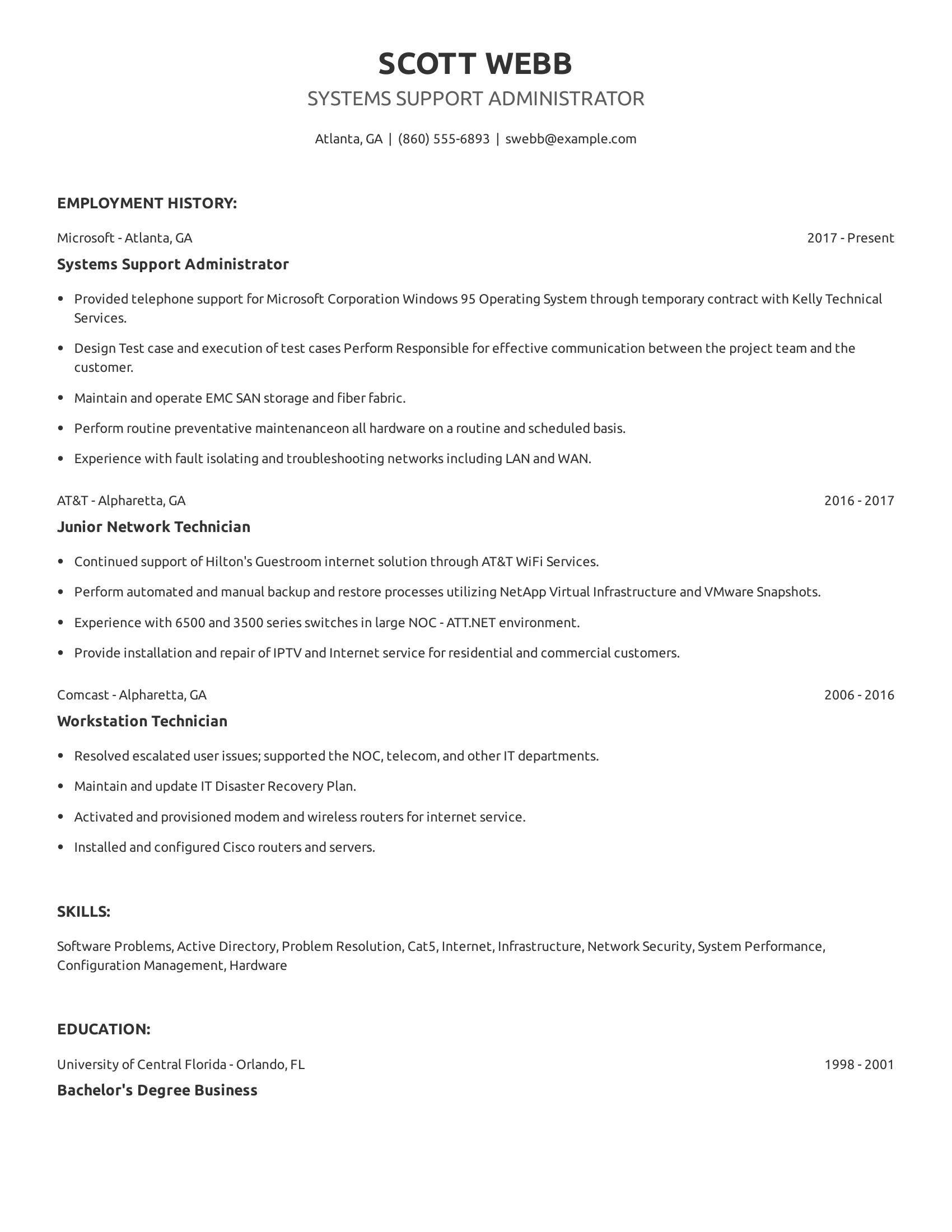
Network administrator resumes should highlight experience with network design, implementation, and troubleshooting. They should include specific technical skills such as configuring routers, switches, and wireless access points. Experience with network security, virtual servers, and user account management is also important. Strong problem-solving skills and the ability to handle escalated support issues are valuable. Clear and concise descriptions of past roles and responsibilities allow potential employers to understand the candidate's expertise.
This resume showcases relevant experience with network design and security using Cisco technology and managing virtual servers. It details specific tasks like configuring VOIP systems, setting up secured wireless access points, and administering satellite communications networks. The resume also lists key technical skills like VPN management, problem resolution, and knowledge of various software and hardware platforms. This demonstrates the candidate's broad range of capabilities in network administration.
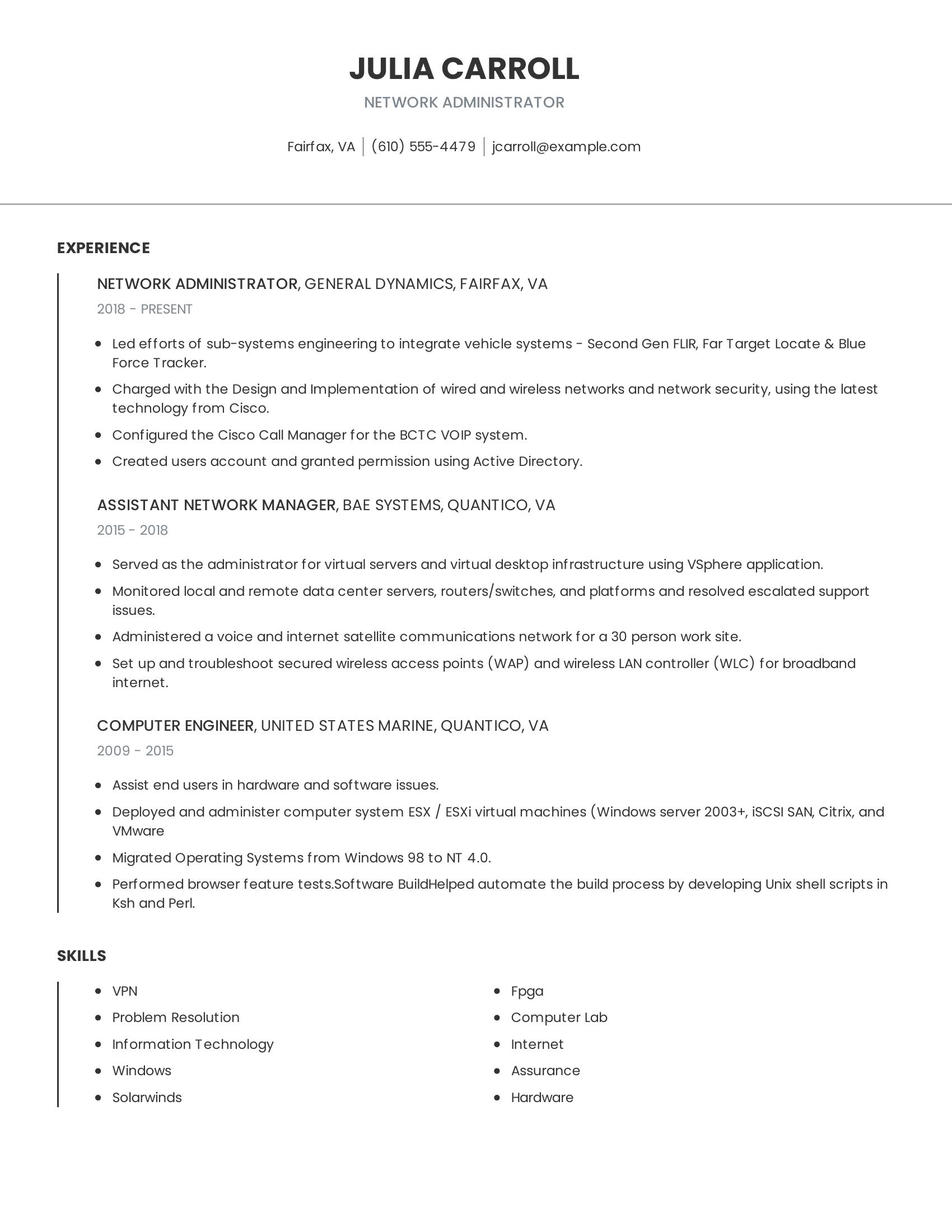
Systems engineer resumes should highlight specific technical skills, relevant work experience, and educational background. Key sections include detailed job responsibilities, specific technologies used, and a clear timeline of employment history. The resume should also list relevant certifications or degrees and provide contact information.
This resume includes detailed descriptions of job roles such as setting up corporate email on smartphones and installing various systems like Voice GWs and Load Balancers. It shows a clear progression in roles from help desk administrator to systems engineer, demonstrating career growth. Additionally, it lists technical skills like LAN, DNS, and Active Directory, and includes a relevant bachelor's degree.
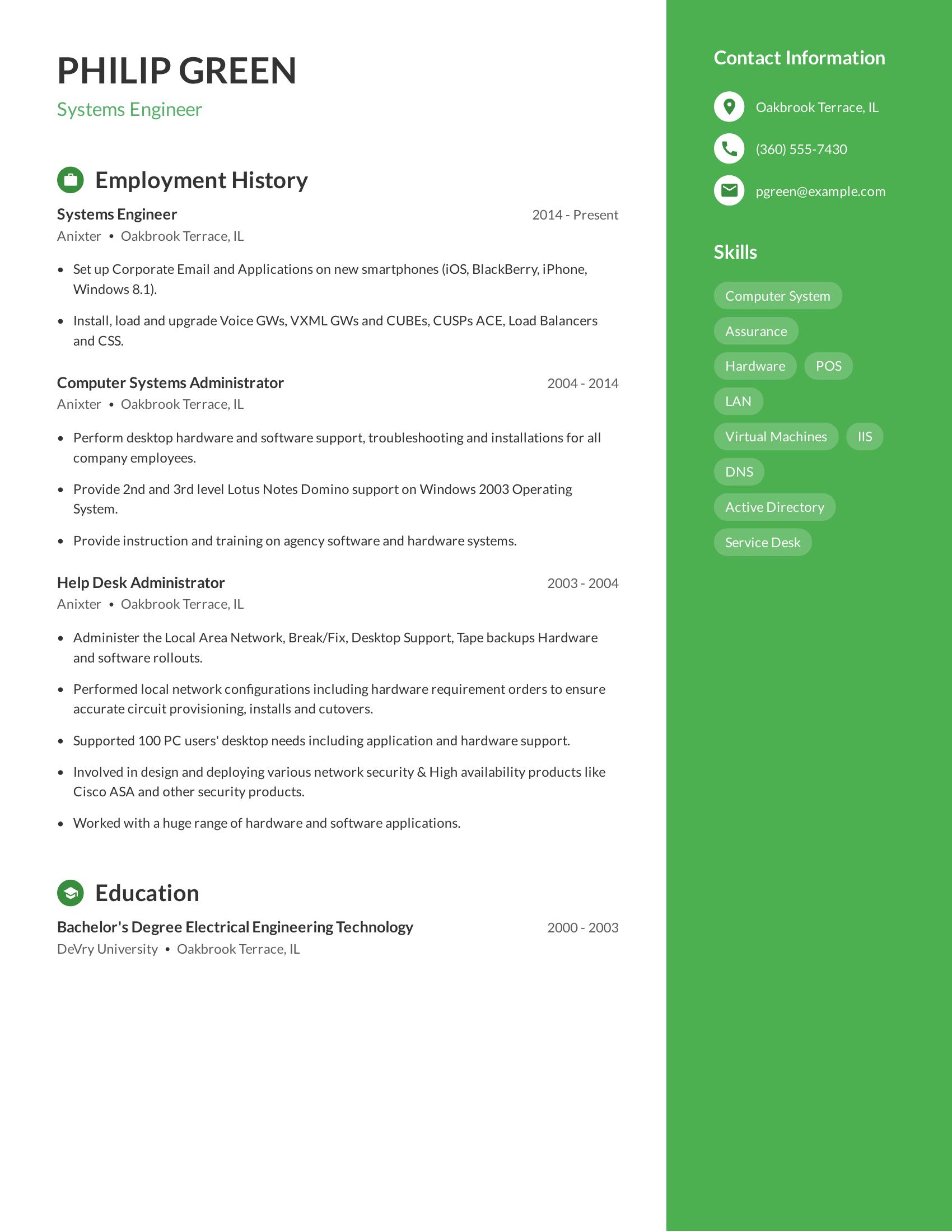
PC systems administrator resumes should highlight technical skills, relevant work experience, and education. Skills like disaster recovery, network security, and operating system migrations are vital. Work experience should show progression in roles and responsibilities within IT environments. Education should include relevant degrees or certifications that support the technical skills listed.
This resume includes relevant technical skills such as disaster recovery, network security, and high availability. The work history shows a clear progression from junior systems administrator to pc systems administrator. It also lists a degree in business, which complements the technical skills with a business perspective. The resume details specific tasks and responsibilities like hardware and software support, migration initiatives, and managing Active Directory.
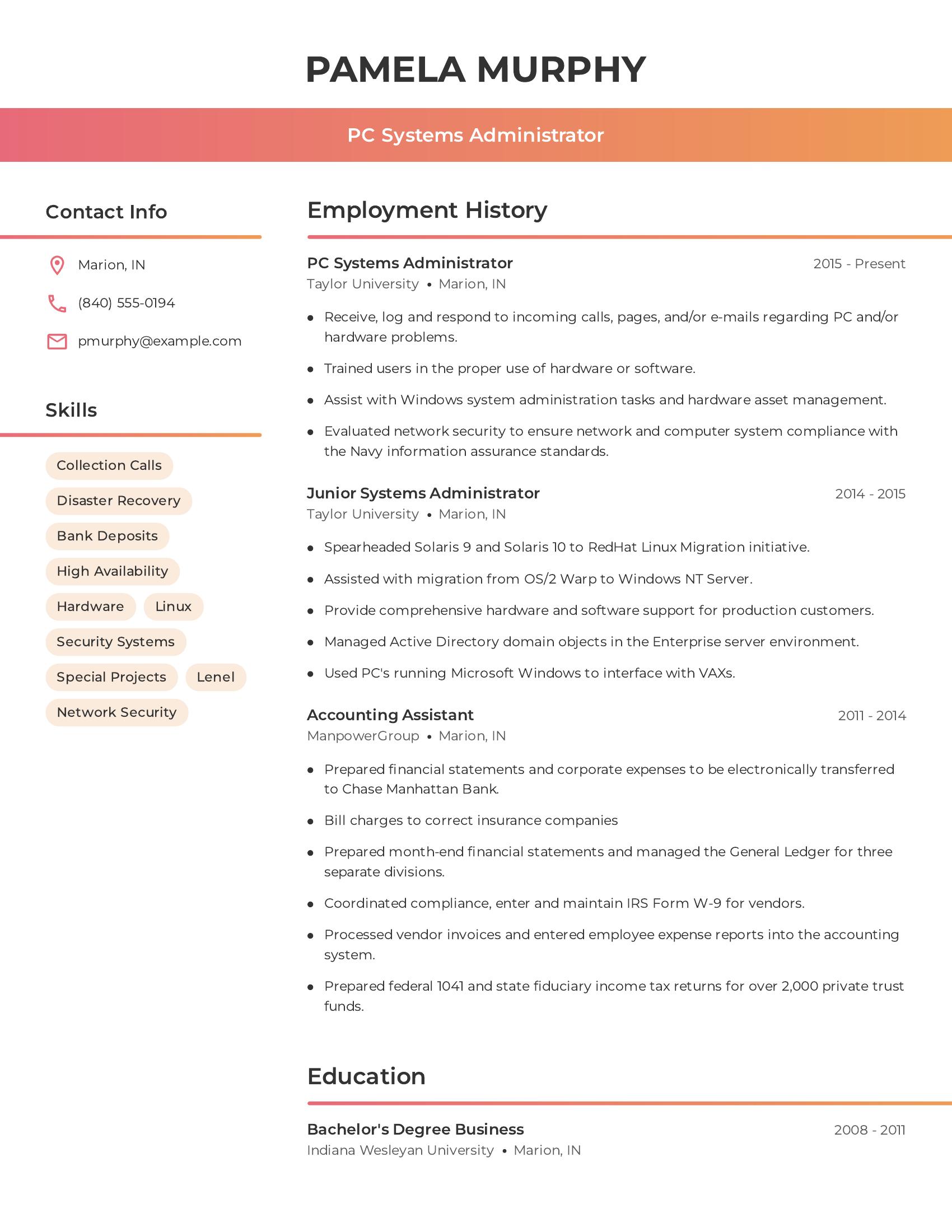
Database systems administrator resumes should highlight relevant experience, technical skills, and education. Key responsibilities like database maintenance, backup and recovery strategies, disaster recovery implementation, and complex query development are important. Experience with different database management systems and environments is valuable. Technical proficiencies in SQL, Unix, data migration, and tools like Azure Data Factory should be included. Educational background in computer science or related fields rounds out the resume.
This resume includes specific job experiences from different roles such as database systems administrator, Unix systems administrator, and SQL server developer. It lists relevant tasks like developing procedures, implementing backup strategies, and migrating databases. The resume also mentions technical skills such as using RMAN, SQL queries, and ETL activities. The inclusion of a bachelor's degree in computer science aligns well with the expected educational background for this role.
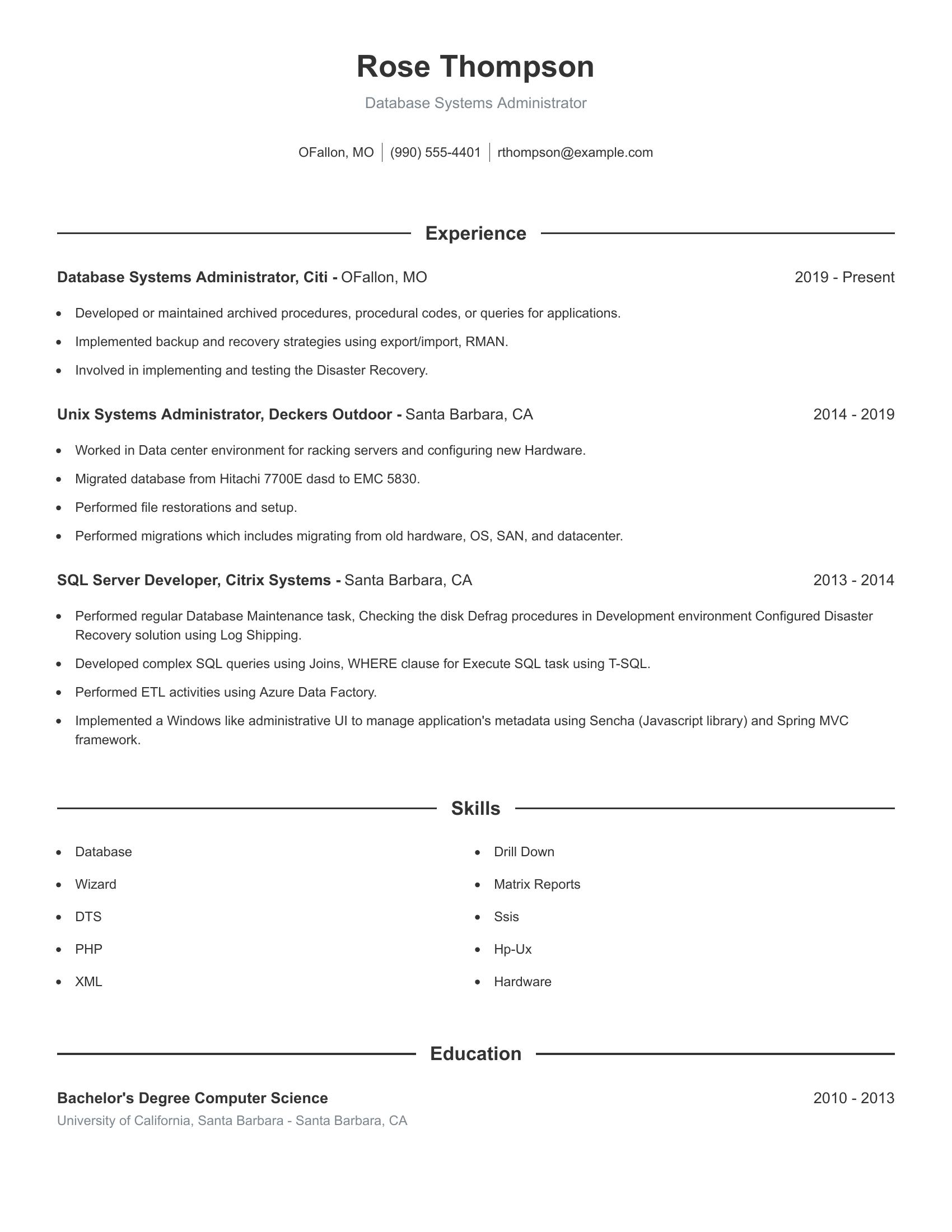
System administrator consultant resumes should include clear headings like contact information, skills, employment history, and education. They should highlight technical skills such as network security, operating systems, and software applications. Employment history should list relevant job roles with specific responsibilities and achievements. Education details must include degrees and institutions attended.
This resume includes all necessary sections. contact information, a detailed skills list, comprehensive employment history with specific tasks and achievements, and education background. The employment history clearly outlines job roles at different companies with relevant duties, showing progression and experience in system administration. Specific technical skills are listed prominently, making it easy to identify the candidate’s expertise.
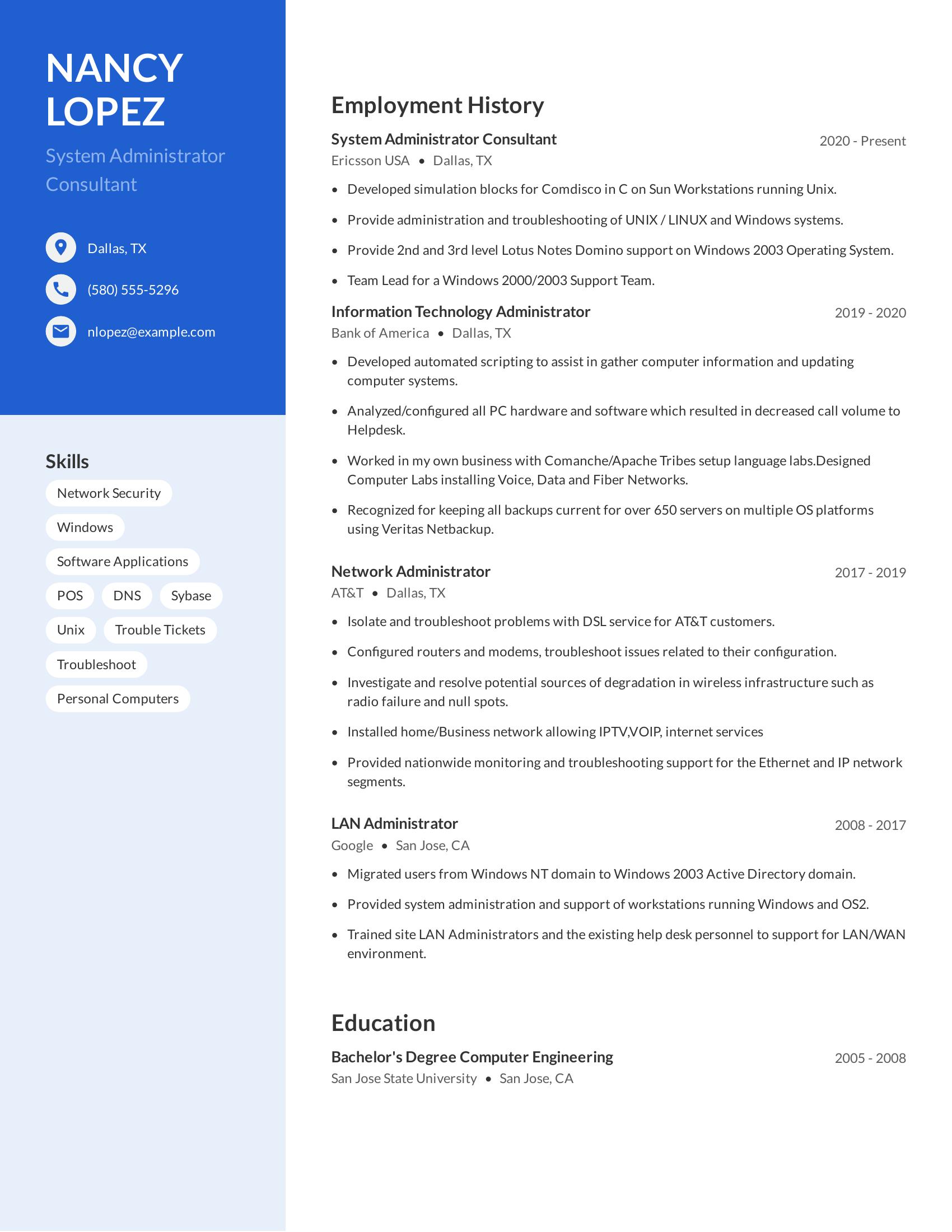
Junior systems administrator resumes should highlight hands-on experience with system and network administration. Important components include detailed descriptions of technical skills, specific job duties, and accomplishments related to system setup, configuration, and maintenance. Additionally, showcasing experience with security protocols, support roles, and relevant certifications or education can make the resume stand out.
This resume effectively includes these specifics by detailing the candidate's experience with configuring firewalls, VPNs, and PKI certificates. It mentions providing support to multiple remote sites, maintaining classified computer systems, and handling asynchronous transfer mode (ATM) operations. Previous roles include defining branching strategies in GIT, upgrading software and firmware, and offering 24x7 support, all of which are crucial for a junior systems administrator role. The resume also lists relevant skills such as project management, system administration, and network security.
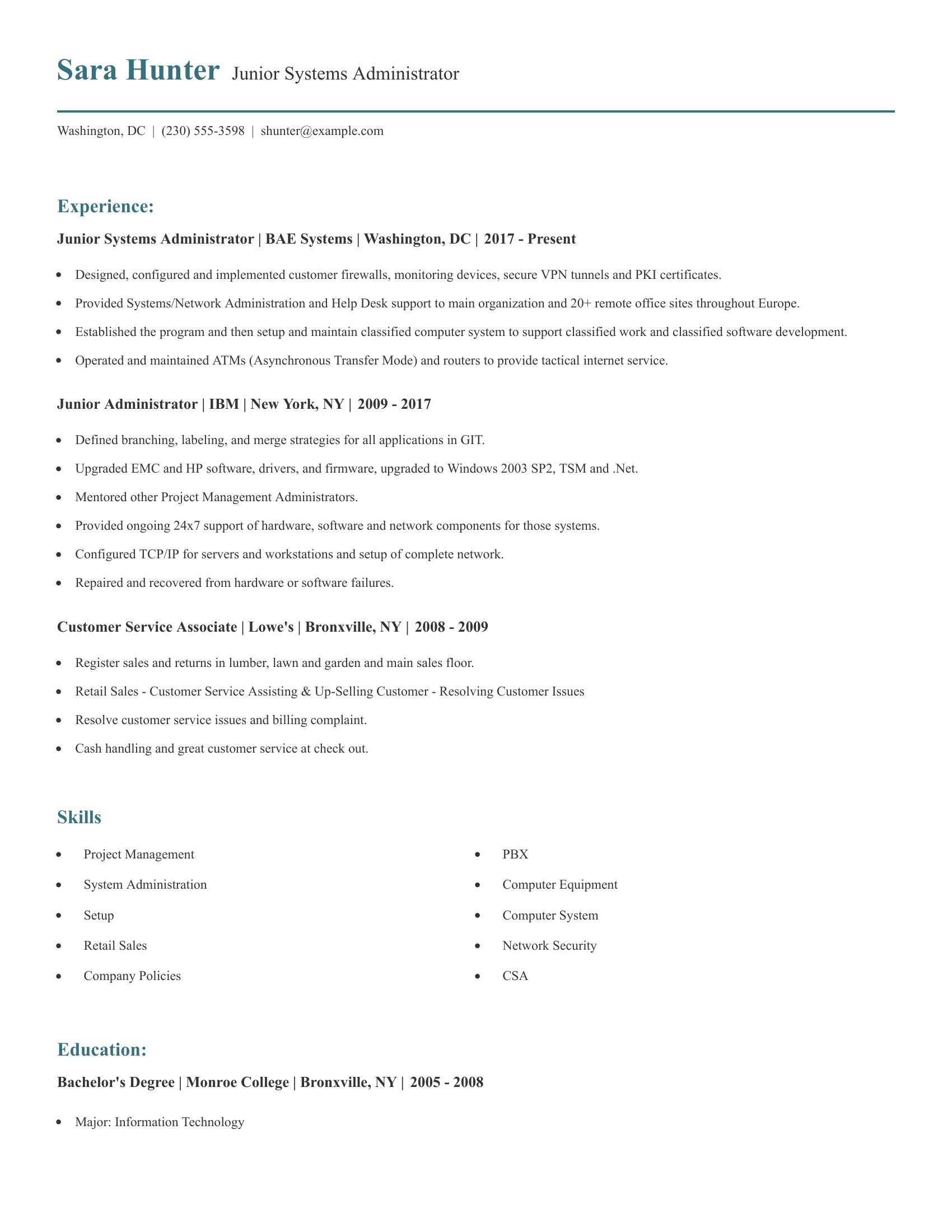
Senior system administrator resumes should highlight relevant work experience, technical skills, and educational background. Key components include job titles, employment dates, company names, and specific responsibilities or achievements. Detailed technical skills related to system administration, such as knowledge of operating systems, network security, and hardware management, are important. Educational qualifications and certifications also add value.
This resume includes those specifics by listing detailed work experience in roles relevant to system administration. It highlights various technical skills like problem resolution, network security, VMware management, and OS migrations. The resume also outlines a solid educational background with a degree in Business from Ohio State University. Furthermore, it mentions hands-on experience with Splunk administration, hardware installs, and software deployment projects.
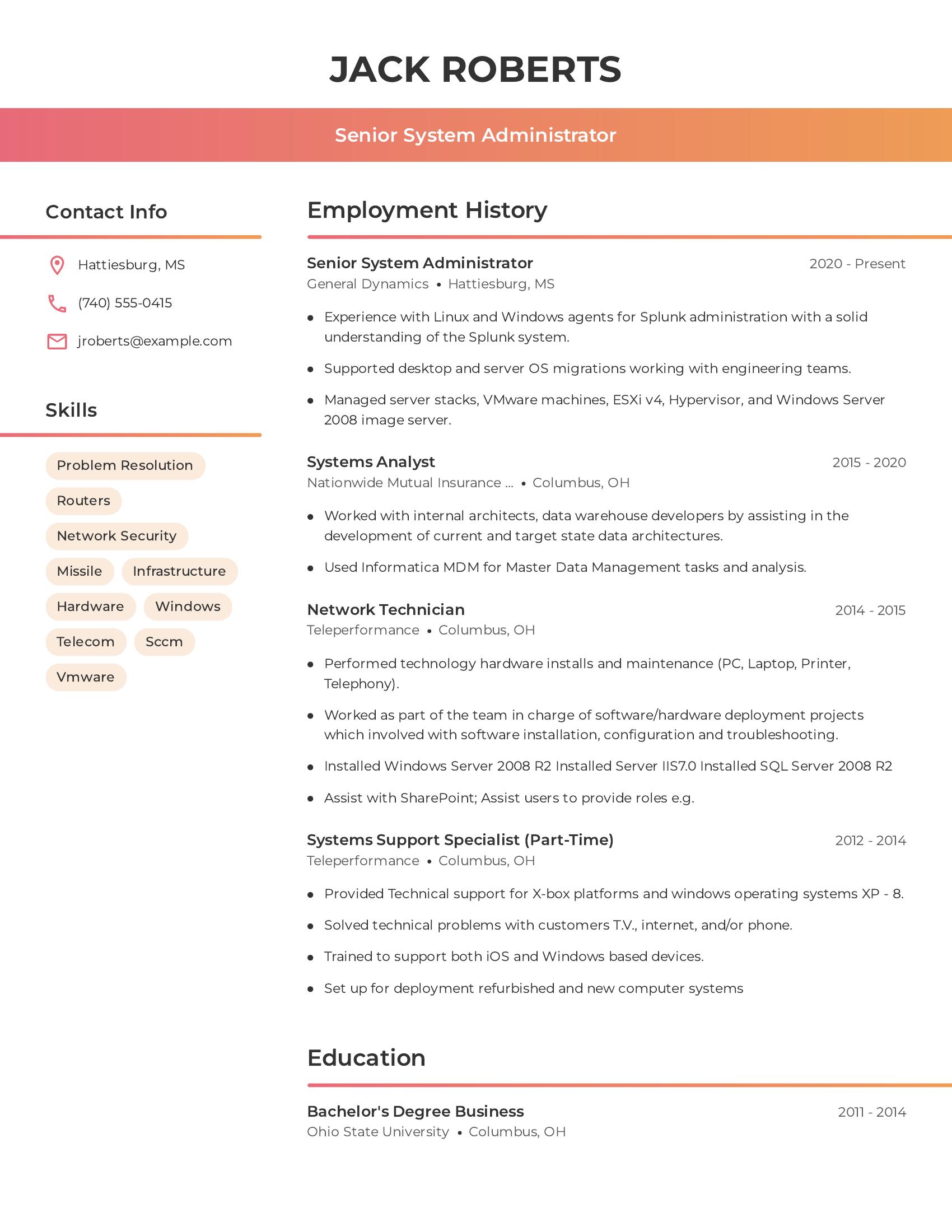
Highlight technical skills. List software, tools, and systems you manage like Linux, Windows Server, VMware, and AWS.
Show problem-solving. Describe how you fixed issues like network outages or server errors, giving specific examples.
Include certifications. Mention credentials like CompTIA Network+, Microsoft Certified. Azure Administrator, or Red Hat Certified System Administrator.
A systems administrator's resume should include contact information, a summary, work experience, technical skills, education, and certifications. The summary should highlight years of experience and major responsibilities. Work experience must list past roles with focus on managing IT infrastructure, troubleshooting issues, and maintaining servers. Technical skills should cover operating systems, networking, and security. Education must show relevant degrees. Certifications like CompTIA Network+ or Microsoft Certified Solutions Associate are important.
A good systems administrator summary should highlight your technical skills and experience with system management. Mention specific systems and tools you have worked with.
Make your summary concise and relevant. Use bullet points to make it easier to read.
Writing a systems administrator experience section should focus on specific responsibilities and achievements. Avoid vague statements and highlight technical skills.
Follow these tips to make your systems administrator experience stand out. Be clear and focus on relevant experiences.
A systems administrator needs specific technical skills to manage and maintain computer systems and networks.
A systems administrator also needs good soft skills to work well with teams and manage tasks effectively.